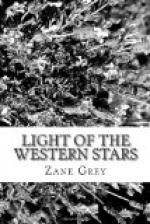Anger checked her panic. She straightened up with what composure this surprise had left her and started for the door. But the cowboy barred her passage—grasped her arms. Then Madeline divined that her brother could not have any knowledge of this indignity. It was no trick. It was something that was happening, that was real, that threatened she knew not what. She tried to wrench free, feeling hot all over at being handled by this drunken brute. Poise, dignity, culture—all the acquired habits of character—fled before the instinct to fight. She was athletic. She fought. She struggled desperately. But he forced her back with hands of iron. She had never known a man could be so strong. And then it was the man’s coolly smiling face, the paralyzing strangeness of his manner, more than his strength, that weakened Madeline until she sank trembling against the bench.
“What—do you—mean?” she panted.
“Dearie, ease up a little on the bridle,” he replied, gaily.
Madeline thought she must be dreaming. She could not think clearly. It had all been too swift, too terrible for her to grasp. Yet she not only saw this man, but also felt his powerful presence. And the shaking priest, the haze of blue smoke, the smell of powder—these were not unreal.
Then close before her eyes burst another blinding red flash, and close at her ears bellowed another report. Unable to stand, Madeline slipped down onto the bench. Her drifting faculties refused clearly to record what transpired during the next few moments; presently, however, as her mind steadied somewhat, she heard, though as in a dream, the voice of the padre hurrying over strange words. It ceased, and then the cowboy’s voice stirred her.
“Lady, say Si—Si. Say it—quick! Say it—Si!”
From sheer suggestion, a force irresistible at this moment when her will was clamped by panic, she spoke the word.
“And now, lady—so we can finish this properly—what’s your name?”
Still obeying mechanically, she told him.




